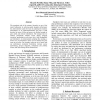Free Online Productivity Tools
i2Speak
i2Symbol
i2OCR
iTex2Img
iWeb2Print
iWeb2Shot
i2Type
iPdf2Split
iPdf2Merge
i2Bopomofo
i2Arabic
i2Style
i2Image
i2PDF
iLatex2Rtf
Sci2ools
129
click to vote
MASCOTS
2004
2004
Mining Performance Data from Sampled Event Traces
The prominent role of the memory hierarchy as one of the major bottlenecks in achieving good program performance has motivated the search for ways of capturing the memory performance of an application/machine pair that is both practical in terms of time and space, yet detailed enough to gain useful and relevant information. The strategy that we endorse periodically samples events during program execution, producing an event trace that is both manageable and informative. As demonstrated, adopting this strategy, a diverse set of performance issues can be studied using the same set of traces. For example, using one set of traces and our performance evaluation framework, memory access performance, process migration, compulsory and conflict misses, and false sharing can be characterized.
MASCOTS 2004 | MASCOTS 2007 | Memory Access Performance | Memory Performance | Performance Evaluation Framework |
Related Content
| Added | 31 Oct 2010 |
| Updated | 31 Oct 2010 |
| Type | Conference |
| Year | 2004 |
| Where | MASCOTS |
| Authors | Ricardo Portillo, Diana Villa, Patricia J. Teller, Bret R. Olszewski |
Comments (0)

